Fight and Win!
Once upon a time, when I was in the middle of growing my first book, Book One of The Chronicles of Eirie, I became involved in a protest…
It involved a tiny bit of river beach that two developers planned to cover with two jetties.
For me the little patch of beach had (and still has) a social history that is integral to our area. In the 50’s and 60’s, before dams were built and population growth required stormwater drains to empty directly (sigh) into the river, that patch of sand was pristine white and was the pulse of summer. Families would stake their patch and all would swim. It was protected from the sea breeze, was clean, had a diving tower in the middle of the river and boats at anchor that we kids could use as marker buoys in races. My grandfather and others established a little regatta on the river and there were even changing sheds built by the Progress Association.
Of course it’s all gone now, and the sand is a kind of pale taupe colour, but the history and memories are there and so eighty or more residents decided to protest. We got signatures for a petition, we mounted an argument and went to Council and managed to prevent the development application from going ahead – all through arguments from the heart.
But the developers took us to a higher court – the Resource Management Appeals Tribunal. Suddenly we were faced with the need for science, the law and money. And myself, a doctor and a lawyer were the ones who took the fight on. We were systematic in research, in garnering specialist argument, in presenting our case (it didn’t hurt that our lawyer, a local shack owner, was the former Federal DPP) and in the end it all came down to saving a small piece of estuarine weed that is feed for a threatened species parrot.
It took two years of our lives though, and in my case, I was subjected to bullying of the worse kind during and after the time.
So why, one would ask, would I step up and join another protest group?
It’s because I value my surroundings.
I’m sick of wholesale plunder of our natural resources.
I’m sick of lack of ethical governance.
I want a world we can be proud of.
I don’t believe that development is the B-all and End-all of planning. (I always find it interesting that the two words ‘Planning and Development’ are in fact one word in the minds of those that govern.)
I am fully in support of halting the Atlantic Salmon fish farms that TASSAL plans for our east coast. They will decimate a prime area of beauty (in fact a World Heritage area) and I will publicise till I am blue in the face that this must not, cannot, go ahead. If it means I damage my writer’s brand, my image, my friendships, then so be it.
(Don’t eat these products. They are not farmed by World’s Best Practice!)
Below are some of the latest points from the argument put forward by the No Salmon Farms for the East Coast.
Quote-unquote…
‘To Ratepayers: DO WE WANT FISH FARMS ON OUR PRISTINE EAST COAST?
THE FACTS
Tourism
- Tourism last year contributed around 2 billion dollars to the Tasmanian economy with a record 1.1 million visitors to our state in 2015 – the highest per capita increase of any state or territory in Australia (Tas. State Government figures).
- Tourism is the second biggest income provider for the Tasmanian economy behind processed metals. The seafood industry ranks number 6 and includes all seafood production. (http://www.tasmaniatopten.com/lists/economic_contributors.php).
- 44 cents in every tourism dollar is spent in regional Tasmanian towns (Richard Colbeck, Tasmanian Senator and Federal Tourism Minister)
- Our tourism industry relies on our international reputation as the ‘clean green state’. An industry dumping excess nutrients and enormous amounts of fish faeces into our shallow east coast bays and coastal waterways will negatively affect tourism through the loss of recreational fishers, natural beauty and the increase in visual pollution.
- Tasmania will need up to 8,000 extra tourism and hospitality workers if the industry continues to grow as expected (Daniel Leesong, Tourism Industry Council Tasmania Chief, The Mercury, 12th May 2016). Big industry is no longer a new jobs-saviour.
- The majority of east coast tourism operators are against the Okehampton proposal.
Regulation
- The Marine Farm Planning Act was established in 1995 and the lease for Okehampton Bay was granted in 1998. A great deal has changed in the last 18 years, so therefore a new marine approval process for this fish farm should be instigated. Otherwise, it will be a demonstration of poor governance by our parliamentary leaders.
- There is no truly independent regulator of the fish farming industry in Tasmania. For example, even though there have been serious problems in Macquarie Harbour with the fish farms, DPIWE has just added an extra 1,350 tonnes to the allowable production. The Department said, ‘The ruling was based on information from the Macquarie Harbour status report and briefings from marine farm operators.’ (The Mercury, 29th April 2016).
- ‘I can say that we’re definitely not putting any additional fish in Macquarie Harbour,’ (Linda Sams, Tassal, ABC News 25th October 2015).
- Politicians rather than independent scientists appear to be making the decisions on whether fish farming applications proceed. “DPIWE prepares a report for the Marine Farm Planning Review Panel. The panel then makes a recommendation to the Minister. The Minister is not required to adopt the panel’s recommendations.” (Hobart Community Legal Service webpage)
- The fish farming industry in Scotland must comply with a detailed code of conduct in relation to sustainability, as is required here with our Forest Practices Code.
Jobs
- When the fishmeal plant in Triabunna closed 29 jobs were lost. Around 15 of these locals were re-employed at Tassal’s processing plant at Triabunna. A nett loss of 14.
- Tassal have stated around 20 new jobs will be created if their proposal proceeds in Okehampton Bay. Very few of these will be filled by the unemployed in Triabunna. “Experienced and qualified staff are important to the responsible operation of any enterprise. However, we recognise that not all locals will have these qualifications.” (Tassal response to the Orford/Triabunna Chamber of Commerce)
- Any jobs created by this proposal need to be weighed up alongside the potential job losses in new and existing tourism businesses, professional fishing, community businesses that rely on the recreational boating trade and Maria Island tourists.
- Tassal has started to cut operating costs and have automated some of their tasks. “There’s a lot of automation that we’re starting to see the benefits of. We’ve been able to take people out of that process of handling or touching fish.” (Mark Ryan – Tassal, The Australian, 12th February, 2016)
Social License
- There a total of nearly 2,000 signatories to combined handwritten and online petitions opposing this fish farm proposal. Therefore, Tassal does not have a social license to proceed with this proposal
- Tassal does not have a social license to proceed with this proposal under the ASC (Aquaculture Stewardship Council) criteria, namely criterion:
- 7.1.1 (page 62), “Evidence of regular and meaningful consultation and engagement with community representatives and organisations”;
- 7.2.1 (page 63), “Evidence that indigenous groups were consulted as required by relevant local and/or national laws and regulations”;
- 7.3.1 (page 64), “Changes undertaken restricting access to vital community resources without community approval”;
- 7.3.2 (page 64), “Evidence of assessments of company’s impact on access to resources”.
Climate Change
- According to a CSIRO report this year, water temperatures were recorded at 4 degrees warmer than average in Tasmanian East Coast waters.
- At the recent ‘Ocean Acidification Conference 2015’ held in Hobart, five world-wide ‘hotspots’ for water temperature increases were identified. Tasmania’s east coast was one of the five.
- Oxygen depletion is a well-known outcome of fish farming. Warmer sea temperatures reduce the amount of oxygen that can be absorbed by seawater. In its half-yearly report Huon Aquaculture said, “A hot summer was putting Macquarie Harbour under additional stress, with oxygen levels in the water falling.” (ABC News, 1st March 2016). Huon Aquaculture has failed to record oxygen depletion levels on their website for their Macquarie Harbour operations since May 2015
- Toxic algal blooms are becoming regular occurrences world-wide. They have the potential to decimate shellfish industries. DPIWE states in reference to fish farming, “Soluble nutrients released to the water column can increase the risk of toxic algal blooms.” (DPIWE Updated 2010 Mercury Passage Marine Development Plan)
- A recent algal bloom on the coast of Chile is believed to be mainly responsible for the death of around 25 million fish and sea mammals, most of which have been washed up along the Chile coastline. (Financial Times, 5th May 2016)
- “There are studies indicating that in Patagonia the greater occurrence of toxic blooms could be a consequence of aquaculture” (Lauria Farias, Oceanographer at Concepcion University, Chile)
Best Practice & Sustainability
- “It is a widely acknowledged fact that salmon farming (as previously and currently practised in Tasmania) has a detrimental effect on water quality and substrate characteristics in close proximity to farming operations” (‘Risks to the Tasmanian Abalone and Rock Lobster Fisheries from the Oceanic Expansion of the Salmonoid Industry’, September 2014)
- Best practice sustainable fish farming is practised in some of the world’s largest fish farming countries. These can involve any of the following three formats: 1. Closed loop land-based fish farms; 2. ‘Giant Nappies’ under each fish pen and 3. Deep water offshore fish farming. Huon Aquaculture is trialling number 3 above.
- Abalone, Rock Lobster and Scallops were regularly fished in the D’Entrecasteaux Channel. These fisheries are no longer there. Coincidentally two thirds of the state’s salmonoid industry is based in the D’Entrecasteaux Channel and lower Huon Estuary.
Pollution
- “Finfish farming has a greater impact on the environment than shellfish farming because of the addition of organic material and fish feed, which results in nutrients in the form of surplus food and excretory products being released to the sediments and waters.” (DPIWE Updated Great Oyster Bay and Mercury Passage Marine Farming Development Plan, 2010)
- Around 7,740 tonnes of salmon fish faeces were deposited in Tasmanian waters last season (43,000 tonnes salmon harvested, TSGA Submission). Most of this initially sits underneath fish pens, rendering that part of the sea floor barren.
- ‘Tasmanian Marine Farm Planning Zones for Finfish’: General Controls: 3.1.1, “There must be no unacceptable environmental impact, to the satisfaction of the Secretary, 35 metres outside the boundary of the marine farming lease”. Why only 35 metres!
- “Specific flow conditions around aquaculture pens, such as tidal flow, the earth’s rotation, local river discharges and the drag introduced by the pens, can lead to pockets of concentrated pollution travelling considerable distances from the source, potentially affecting coastlines far from the aquaculture pens themselves” (Lenfest Ocean Program, April 2011)

- Noise and visual pollution would include 28 large fish pens, 130 – 165m jetty, large feed boats, constant noise 24/7, large bright lights at night and navigation hazards. Marine Protection Tasmania Inc. May 2016.’
***
SO:
IF YOU WISH TO SUPPORT THE FIGHT GO TO
https://www.facebook.com/groups/1403372869976237 and ‘ like’.
And sign this petition:
and to show we are not being parochial or precious –
https://www.facebook.com/NoSalmonFarmsAtSea
We live on the edge of a World Heritage Environment. This is acutely at risk, thanks to TASSAL.

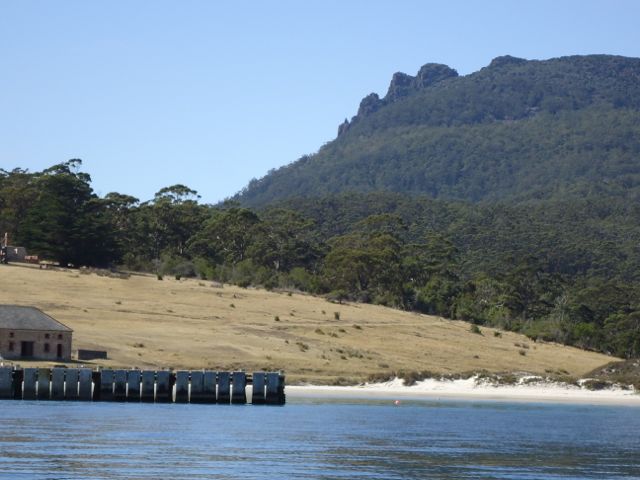


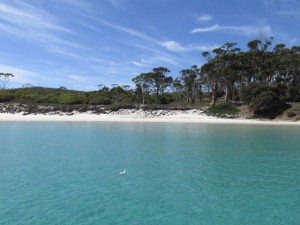
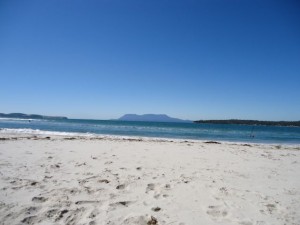
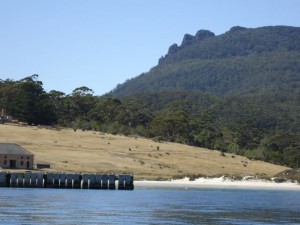


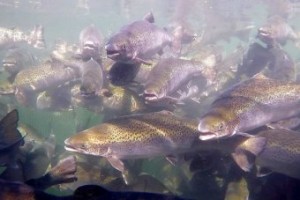
I have dived the D’C Channel since 1973 but now find it a cesspool. A fine layer of silt covers everything and the Crays and fin fish are basically non existent. LETS NOT LET THIS HAPPEN TO THE EAST COAST. Fish farms should either be on shore on off the continental shelf
This is what we hear, Pieter. Let’s get an army of supporters and let’s get loud!!!
Best of luck in your fight, Prue! You’re doing your bit to save our planet. Thanks!
ThankS, Anne. Somehow it’s more important than writing books!
Well done Prue, this needs to be shared with as many people as possible
Regards
Grant
Feel free to share the link everywhere, I’m okay with that!
Really interesting article Prue, I can see why you are against the fish farming, hope you succeed xxx
Thanks, Libby. I think we have to stand up against government and big business for what we believe in. And stand up loud.
Thank you for Stepping Up Prue. This campaign will create a unified and diverse community voice for the protection for our magnificent and globally unique East Coast
Hi Benny. It’s a place we must protect. So much of the world that is beautiful is diminishing in the face of unregulated business. I have had 64 years of unadulterated joy in the pristine waters of the coast. I hope any grandkids of mine or my friends have that same chance.
Well done Prue. We need more high profile people to speak out. I have grandchildren who love Spring Beach and want their children to have it too.
Thanks Sue. I think the sad thing is the way this is being ‘rushed’ through and essentially under the radar of the general public. Whatever else Tassal might say, they have hardly been blindingly communicative with the general public.
You can talk to shack-owners every day who have no idea that this is planned. What is even more worrying, is that even those who live here and who want the so-called jobs from an company who has already publicly admitted they are moving to automation and mechanisation, is that they think it is one lease only.
Amazing to see how secretive Tassal has been about all the other potential leases. I have a map from a university scientist which shows potential leases right in against the Louisville/Raspins shore. Let alone the scallop lease which on this map is extending from Lachlan’s Island to north of Rabbit Island. So in fact lengthening the old scallop lease from both ends. I shall make the map public ASAP.